Random Reviews: The Rocketeer: The Complete Adventures
Dave Stevens' original creation soars high, blending historical fiction and pulp heroism across two entertaining adventures
—by Nathan on July 19, 2025—
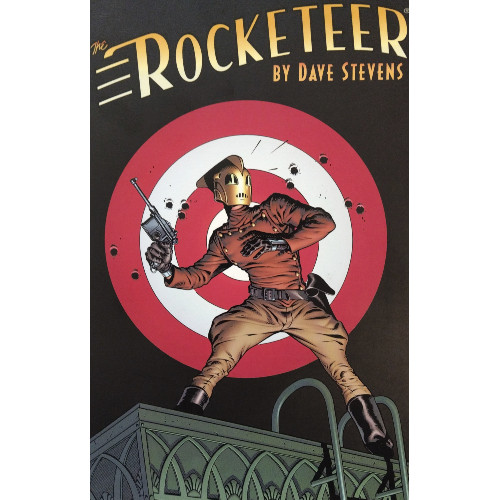
I have a very vague memory of, years ago during a family movie night, watching a Disney film about, of all things, a superhero. We watched this movie a few years before the advent of cinematic universes based on comic books, and this film was made years before the seeds of possibility which sprouted into MCU and DCEU were planted through Blade, X-Men, and the Sam Raimi Spider-Man films. The movie in question was 1991's The Rocketeer, starring Billy Campbell, Jennifer Connelly, Timothy Dalton, and Alan Arkin, and directed by Joe Johnston, who would overseer one of the early MCU films, Captain America: The First Avenger, years later.
I'll admit to not remembering much of the movie in depth, my mental film projector calling up a few shots of Campbell's Cliff Secord soaring through the air or the lumbering Lothar folding a man in half. I know the film was fairly well-received at the time of its release but that a rather poor box office shuttered plans for a trilogy, placing The Rocketeer in the annals of beloved cult classics rather than box office darlings.
I couldn't tell you if I was aware The Rocketeer was originally created as a comic when I first saw the film or if I learned that later. What I can say is I recently sat down to re-read the complete collection of creator Dave Stevens' work on his creator-owned title. An inker and storyboard illustrator, Stevens was approached in 1982 by the founders of Pacific Comics to develop a fill-in story for issues of Mike Grell's Starslayer, which needed some padding. Stevens developed the Rocketeer, a homage to serial movie and pulp heroes–think guys like Doc Savage, the Phantom, and the Green Hornet.
This volume collects two stories developed by Stevens: an origin for the character, published by Pacific and then Eclipse Comics after they absorbed the former company, followed by half of a six-part adventure published between Comico and Dark Horse. I've read that Stevens' meticulousness in both his research and attention to detail led to large stretches of time between issues–thirteen years total for these two narrative to be mostly told (which I say because the sequel was apparently a projected six-part story). Stevens passed away in 2011, and though other creators have carried on the Rocketeer's jetpack, this collection is all we have of Stevens' original, beloved, yet woefully unfinished work. "Complete," yes, but sadly unfinished.
This will be a review of just the comics, not the movie, and I won't do much compare/contrast between the comic and the film, as my memory of the movie is limited. So if you're willing to strap yourself to a jetpack or fasten your airplane seat belts, you can follow me to the aerial showcase that is…
The Rocketeer: The Complete Adventures
Writers: Dave Stevens, with Paul Demeo and Danny Bilson
Pencilers: Dave Stevens, Jaime Hernandez, Michael Kaluta, Arthur Adams, Sandy Plunkett
Inker: Dave Stevens
Colorist: Laura Martin
Letterers: Dave Stevens, Carrie Spiegle
Issues: Starslayer #2-3, Pacific Presents #1-2, The Rocketeer Special Edition #1, and The Rocketeer Adventure Magazine #1-3, and material from Starslayer #1
Volume Publication Date: March 2015
Issue Publication Dates: February 1982, April 1982, June 1982, October 1982, April 1983, June 1983, July 1988, July 1989, January 1995
Publishers: Pacific Comics, Eclipse Comics, Comico, Dark Horse (issues); IDW (collection)
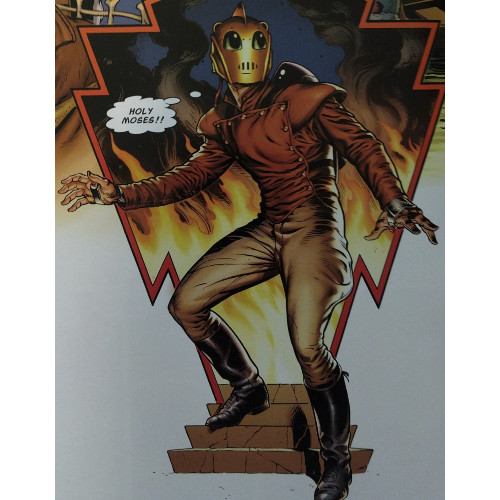
The first thing you may notice from the credits are all the names associated with the Rocketeer, guys like Jaime Hernandez and Art Adams. From what I've read, Stevens had help at points putting The Rocketeer together, even in the writing department, so though the idea and the bulk of the work was his, he had help, and I thought at least presenting other contributors was only fair. My own volume of Stevens' complete adventures is a remastered version, with at least the coloring updated for this collection. I'll admit it would have been nice to have these issues presented with the original coloring–panels, to me, are reminiscent of Marvel's recoloring of the Walt Simonson Thor omnibus, looking a bit too modern for my tastes.
It's impossible for anyone to look at the dearth of Rocketeer material Stevens produced and shake their head slightly in a "what a shame" fashion. We have only eight issues total produced over thirteen years–had The Rocketeer been a monthly book, with rotating artists and writers, it would have easily hit its 100th issue by 1995. But those eight issues, with months if not years between some of them, represent a strong slice of material developed by a man who took time and had the necessary patience to develop his craft.
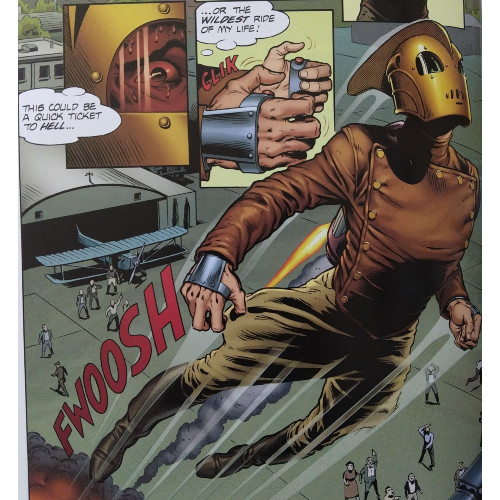
As I noted, the collection I own has been recolored, but that doesn't take away from the detail Stevens incorporates in these issues. The Rocketeer is a period piece, a nod to those pulp heroes I referenced, set firmly in an America prior to its inclusion in World War II yet very aware of the mounting Nazi threat. Any fan of Indiana Jones will feel right at home watching the Rocketeer punch Nazis across the kisser with a jetpack strapped to his back. We get attempted kidnappings, some chases, a fight in a fun house, an attempted plane hijacking…action of all kinds graces the page, which only cements Stevens dedication to the story. He's willing to try new things, create new environments, and generate new conflicts. There's a lot of fun variety to be found in these pages, all of it with a great level of detail.
The Rocketeer himself, amateur stunt pilot and red-blooded American Cliff Secord, feels like an homage to both the pulp heroes of yesteryear and some of the more classic superheroes of the 60s. Cliff has no powers, just a jetpack, and his heroism is limited by the technology he has access to. He's fighting Nazis, those classic antagonists we all love to hate. Around him exists a world fully entrenched in the late 30s–the kinds of planes Cliff flies, the cars that are driven, the way folks speak, the clothes people wear–fully drawing us into this world. You genuinely believe Stevens did his research, effortlessly crafting a believable, lived-in reality that could have existed during this period. No superhumans flying through the cities, just a guy in a jetpack. No doomsday devices Cliff just needs to stop, just seditious secret agents and a lumbering circus freak turned serial killer. For all the flying Cliff does, he belongs in a very grounded world.
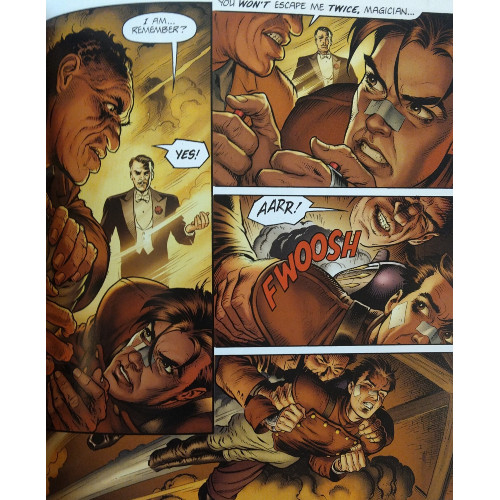
Cliff himself falls into the "likable jerk" category. He has his flaws, and Stevens outlines them pretty well–he's not the most responsible guy on the planet, our Cliff, yet responsibility is thrust upon him when he finds the experimental jetpack and initially decides to use it as a way to make extra dough to give his girlfriend Betty the more upscale life she desires. There's a selfish tinge to him which gets ruptured when he realizes the weight that comes with this jetpack (and I don't just mean the physical heft of the thing). He can't just fly around, hither-and-yon. He doesn't ask to become a superhero, and he really never becomes one, not in a modern sense, but finding and choosing to use the jetpack opens him up to a more sinister side of life and demands he grow up just a little in order to face a very real darkness he was ignorant of previously.
I won't go so far as to say Stevens blatantly rips-off a character like Spider-Man, but he gives Cliff strengths and flaws which make the Rocketeer human, and Cliff's initial reluctance to do anything heroic is reminiscent of not just Spider-Man but characters such as the Hulk and the Fantastic Four as well. Like these classic characters, Cliff stumbles into heroism, sometimes unintentionally placing himself and others, such as his girlfriend Betty and friend Peevy, in trouble with Nazis and federal agents, but doing what he can to fix any problems, even if he causes them. Stevens nicely documents Cliff's attempts at learning to use the jetpack–it's a rough route, with mistakes and crashes made along the way, but it serves to showcase Cliff's humanity. Nobody could pick up an experimental jetpack and fly it perfectly the first time, so while Cliff learns to use his newfound gadget for less self-serving means, he also learns how to modify said gadget and have it better serve him.
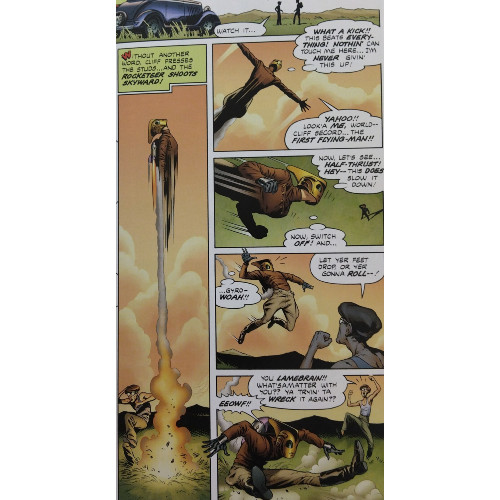
It's the origin which lays out all these pieces–finding the jetpack, the girlfriend, punching Nazis, becoming an unintentional hero–and the sequel (originally titled "Cliff's New York Adventure") follows up these concepts as Cliff pursues Betty, who plans to set off with a less-than-honorable potential employer to take that "booshwah" lifestyle, as Cliff says, which she craves. Most of the pages surround Cliff and his (mis)adventures across the Big Apple, but Stevens allows Betty a bit of characterization here as well. I do wish Betty was given a tad more agency–by the story's end, we see some change on her part, but we don't see the transformation. She has a one-track mind throughout these collected issues, suddenly turning some things around by the final panel. Maybe she was intended to be given more to do in additional issues Stevens never got to–nearly six years passed between the second and third chapters of this sequel–and though there is a resolution of sorts to her arc, knowing more could have happened leaves her in a somewhat unfortunate spot.
The sequel also suffers from some spontaneous backstory Stevens gives Cliff to allow the narrative's villain, Lother (cast as that "lumbering circus freak turned serial killer" I mentioned, whereas the movie portrayed him as a hired assassin), greater connection to Cliff. I don't necessarily mind the connection itself, nor do I mind Cliff having more of a background, but Stevens utilizes it in a convenient way for this tale rather than making the backstory feel like an integral aspect of Cliff's character. A cynical part of me wants to note the guy had years to develop something a tad more interesting, but let's just leave this as a complaint. The sequel doesn't feel as well-wrought as the first installment, even if it still maintains Steven's artistic quality, with help from a few friends.
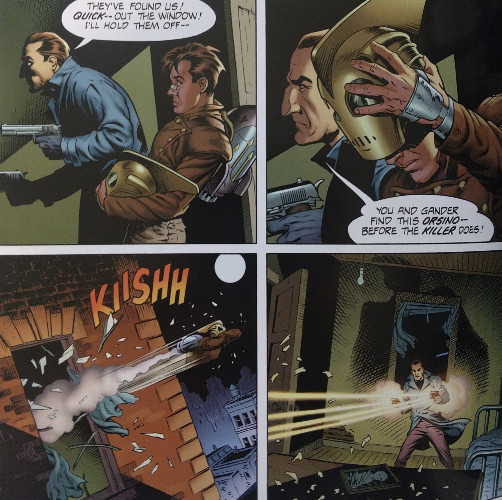
Outside the story and characters, readers will find a lot of fun with the details Stevens incorporates. We get a diner shaped like a bulldog, a cameo appearance from Howard Hughes, and an enigmatic character who is somewhat subtly indicated to be the Shadow. History and pop culture are intertwined here, Stevens artfully acknowledging his debt not only to real-world events and figures but also the characters that inspired his own creation.
The Rocketeer, as a character, has outlived its creator, with new anthology stories and limited series periodically published by IDW. The lack of Stevens' contributions is not necessarily his fault–a little research shows Comico's bankruptcy, an earthquake bursting a water pipe in Stevens' studio, and Stevens' own flagging interest prevented more material from being published before his death. So personal choices and unintended setbacks combined to keep Stevens from creating more adventures with Cliff Secord. But the work we've been given remains solid to this day, two (mostly finished) adventures that showcase Stevens' admirable attention to detail, thrusting a young man who becomes a reluctant hero into a world where he needs to grow up a little. It's a classic idea, given its own spin, and though Cliff hits some turbulence, he never finds himself in a tailspin.